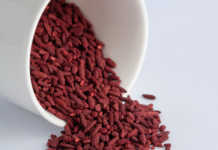
Pycnogenol can support Healthy Heart Function
by Horphag Research
The majority of cardiovascular ailments involve insufficient vascular functions in one way or the other. Blood pressure, blood glucose and atherosclerosis develop largely unnoticed and before diagnosis, may cause irreversible damage to the vascular system.
A healthy lifestyle involving more physical activity and dietary interventions can significantly defy cardiovascular risk factors. We examine research on Pycnogenol® (pic-noj-en-all), a natural plant extract originating from the bark of the maritime pine tree that grows along the coast of southwest France. Clinical research demonstrates that super antioxidant Pycnogenol is highly effective for keeping blood vessels in good shape and keeping cardiovascular health problems at bay.
Pycnogenol restores healthy endothelial function
The common denominator of most cardiovascular risk factors is the inability of a blood vessel to generate the most important vascular mediator: nitric oxide (NO). Nitric oxide is continuously synthesized by cells lining blood vessel walls (endothelial cells). The NO molecules diffuse out of the blood vessel and interact with a specific receptor on arterial smooth muscle causing relaxation and consequently an increased vessel diameter. This then facilitates better blood perfusion and normalizes blood pressure.
In hypertension, atherosclerosis, diabetes and aging, the synthesis of nitric oxide from the endothelium declines. This results in blood vessel constriction, which impairs blood flow and increases “stickiness” of platelets which elevates the risk for thrombosis.
Pycnogenol® acts as a catalyst on the enzymes in the endothelium which synthesizes nitric oxide. In the presence of Pycnogenol, the endothelial nitric oxide synthase more efficiently generates nitric oxide from the precursor amino acid L-arginine [Fitzpatrick et al., 1998].
Pycnogenol® improves blood flow
Microscopical evaluation of capillaries at the root of the fingernails showed that consumption of 60mg of Pycnogenol a day for four weeks significantly dilates these vessels and improves the micro-circulation [Kohama, 2004].
Investigation of Pycnogenol® on endothelium-dependent vaso-relaxation and blood flow was investigated in 16 young healthy volunteers in a double blind, placebo controlled study [Nishioka et al., 2007]. Endothelium mediated vaso-relaxation was initiated by intra-venous infusion of increasing amounts of acetylcholine, a neurotransmitter which stimulates enhanced synthesis of nitric oxide. After two weeks supplementation with Pycnogenol,® the acetylcholine-triggered vasorelaxation,yielded an up to 46 per cent higher forearm blood flow than at baseline. This effect was significant as compared to ineffective placebo. When subjects were given an NOsynthase inhibitor (NG-monomethyl-L-arginine) Pycnogenol® had no effect, which demonstrates that Pycnogenol® acts as a catalyst for endothelial nitric oxide synthase yielding elevated NO synthesis.
Pycnogenol® relieves high blood pressure
Pycnogenol® was investigated in a double blind, placebocontrolled, crossover study with patients with borderline hypertension, who were not yet receiving anti-hypertensive medication. Pycnogenol® supplementation over a period of eight weeks significantly lowered blood systolic blood pressure as compared to placebo. Diastolic pressure was found to be lowered as well [Hosseini et al, 2001].
Pycnogenol® has further been tested in hypertensive patients receiving treatment with calcium channel blocker nifedipin (20mg per day). One group of patients received Pycnogenol® in addition to nifedipine, whereas the control group was administered placebo in addition to the nifedipine regimen. Almost 60 per cent of the patients who supplemented with Pycnogenol® were able to cut their prescribed medication dosage by half to keep their blood pressure in a healthy range [Liu et al, 2004].
Pycnogenol® normalizes blood platelet activity
The acute problems occurring during thrombosis and heart attack result from aggregating blood platelets. The damage to blood vessel walls also manifests in lowered nitric oxide synthesis. When platelets recognize a pathologically altered vessel wall as injured the development of a clot is triggered.
The resulting thrombus may cause clogging of blood vessels (embolism) and subsequently interrupt the blood flow to certain areas of the body. This may be life threatening when a blood clot obstructs arteries of the lung, disabling vital oxygen uptake (pulmonary embolism).
By virtue of increasing the production of endothelial nitric oxide, Pycnogenol® significantly lowers the activity of blood platelets. NO is the natural body-own messenger molecule to release increased platelet activity.
Pycnogenol® was shown to dose-dependently lower platelet activity in individuals typically presenting with increased platelet activity: cigarette smokers. Blood was drawn before and two hours after administration of a single Pycnogenol® dose. The results clearly showed a dosedependent reduction of platelet activity. Already the lowest dose of 25mg significantly lowered blood platelet “stickiness” [Pütter et al., 1999].
Pycnogenol® was shown to be as effective for controlling platelet activity as aspirin in these experiments [Pütter et al., 1998]. Moreover, Pycnogenol® was found not to increase bleeding time, an effect which is well known in case of aspirin, which significantly prolongs bleeding. The application of Pycnogenol® for regulation of platelet function is patented (US 5,720,956).
Pycnogenol® was tested in a group of 200 high-risk individuals for developing thrombosis [Belcaro et al., 2004]. Subjects remained in a sedentary position for a prolonged length of time during long-distance travel exceeding eight hours. These conditions are known to cause pooling of venous blood in the legs, which contributes to the development of thrombosis. The result showed five incidents of thrombosis in the 97 subjects (5.15 per cent) in the placebo group. In contrast, none of the 101 high-risk subjects in the Pycnogenol®-treated group developed thrombosis during the long-distance flight.
Pycnogenol® improves blood lipid profile
Pycnogenol® was found in three clinical trials to lower LDL cholesterol and increase HDL. A significantly improved blood lipid profile was initially discovered in young healthy subjects [Devaraj et al, 2002].
Supplementation with Pycnogenol® for six weeks significantly increased HDL and lowered LDL cholesterol. A follow-up measurement four weeks after discontinuation of Pycnogenol® showed that LDL returned to baseline values whereas HDL largely remained unchanged. No effect on total triglycerides was found.
In men with mild hypercholesterolemia supplementation with Pycnogenol® over a period of three months statistical significantly lowered both total cholesterol and LDL by 9.4 per cent and 16 per cent, respectively [Durackova et al., 2003].
A large-scale double blind, placebo-controlled clinical trial with 200 peri-menopausal women showed a significant decrease of LDL as compared to baseline as well as ineffective placebo by 9.9 per cent [Liao et al., 2007]. HDL cholesterol increased significantly by 4.6 per cent during the six month treatment period. No effect on total triglycerides was found.
Pycnogenol® offers a safe nutritional approach to address all major cardio-vascular risk factors simultaneously. Pycnogenol improves the blood lipid profile with lowering of LDL cholesterol, lowers blood glucose in hyperglycemia, normalizes elevated blood pressure and helps prevent thrombosis.
For more information visit www.pycnogenol.com.










